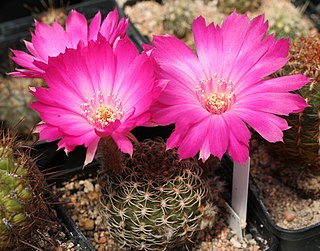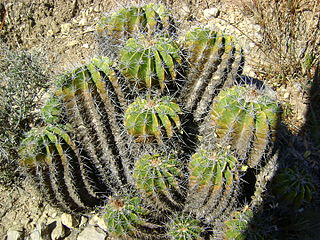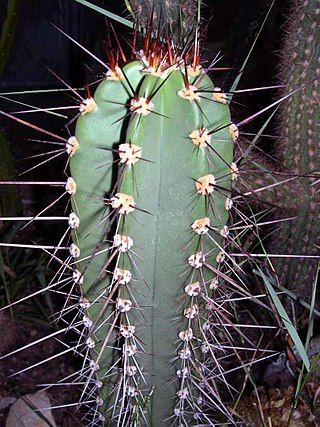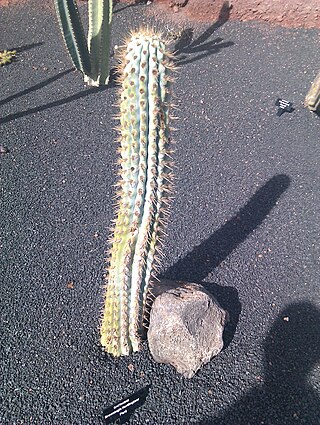
Mitrocereus is a monotypic genus of cacti. Its sole species is Mitrocereus militaris, native to Mexico.

Lophocereus marginatus is a species of plant in the family Cactaceae. It is sometimes called Mexican fencepost cactus.

Lophocereus schottii, the senita cactus, is a species of cactus from southern Arizona and north-western Mexico, particularly Baja California and Sonora. Ultramafic soils facilitate the endemism of plant species and are often associated with their distribution.

Lobivia backebergii is a species of flowering plant in the cactus family Cactaceae, native to eastern Bolivia and southern Peru.

Echinocereus pectinatus is a species of hedgehog cactus.

Echinocereus nivosus is a species of cactus native to Mexico.

Ferocactus flavovirens is a species of Ferocactus from Mexico.

Ferocactus gracilis, the fire barrel cactus, is a species of Ferocactus from Northwestern Mexico. This cactus gets its common name from the striking red coloration of its defensive spines and flowers.

Lobivia ancistrophora is a species of cactus. It has a globular shape, few spines, with large, white flowers attached to long, green tubes. It occurs in Bolivia, at altitudes of 600–1800 metres. Under its synonym Echinopsis ancistrophora it has gained the Royal Horticultural Society's Award of Garden Merit.

Lobivia bridgesii, is a species of Lobivia found in Bolivia.

Lobivia ferox, is a species of Lobivia found in Bolivia and Argentina.

Polaskia chichipe is a succulent cactus native to a small area of mountains of northern Oaxaca and southern Puebla, Mexico. It grows in xerophytic shrubland between 1,600 and 2,300 meters above sea level.

Neoraimondia arequipensis, synonym Neoraimondia macrostibas, is a tree-like cactus native to western Peru. It was first described in 1835 as Cereus arequipensis.

Neoraimondia herzogiana is a tree-like cactus native to Bolivia.

Armatocereus procerus is a species of Armatocereus found in southern Peru.

Browningia hertlingiana is a species of Browningia found in Peru.

Lobivia caineana is a species of Lobivia found in Bolivia.

Cochemiea poselgeri is a species of Cochemiea found in Mexico

Echinocereus barthelowianus is a species of cactus native to Mexico.

Echinocereus sciurus is a species of cactus native to Mexico.





















